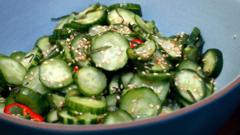Icelandic supermarkets have been left in a pickle, after a viral TikTok trend saw an unprecedented surge in demand for cucumbers – leaving suppliers racing to keep up.
It comes after social media influencers in the small Nordic country began sharing a salad recipe of grated cucumbers, sesame oil, garlic, rice vinegar and chilli oil.
The recipe has been such a hit that farmers in the country have been unable to keep up with spiralling demand, Iceland’s farmers association – the Horticulturists’ Sales Company (SFG) – told the BBC.
While one supermarket chain – Hagkaup – questioned the link between demand and the trend, it told the BBC that purchases of cucumber had more than doubled.
SFG’s marketing director said that as things stand farmers in Iceland are not managing to keep up with surging consumer demand, but said she hopes supply will be back to normal “in a week or so”.
Kristín Linda Sveinsdóttir told BBC News the recipe had proven to be “really popular” and other ingredients in the recipe were selling out as well.
The viral trend has its roots in Canada – where TikToker Logan Moffitt, dubbed “cucumber guy”, external, has been sharing novel recipes using the variety.
“Sometimes, you just need to eat a whole cucumber,” is the influencer’s go-to phrase at the start of his many recipe videos.
The content creator has more than 5.5 million followers and has been sharing cucumber recipes almost everyday since July.
The one that appears to have gripped users in Iceland uses sesame oil and rice vinegar, but sometimes Logan mixes in cream cheese, avocado, and even smoked salmon.
Despite the influencer’s enduring online popularity, experts in Iceland have been keen to play-down his association with the ongoing shortages.
Hagkaup told the BBC it is common to experience shortages in Icelandic cucumber at this time of year.
While the company’s food product manager, Vignir Þór Birgisson, said sales of ingredients like sesame oil and some spices have “doubled” in his stores, he said the current shortage is not solely due to the TikTok trend.
Ms Sveinsdóttir from the SFG also expressed some scepticism, suggesting other factors were at play. Some cucumber farmers replace their cucumber plants at this time of year, which are not yet producing large amounts, she said.
In addition to this, schools are returning from the summer holidays, which puts additional pressure on supplies.
“Everything is happening at the same time,” Ms Sveinsdóttir observed, but said the social media trend remained one of the main contributing factors.
“This is the first time we have experienced something like this,” Ms Sveinsdóttir said, adding that had the TikTok trend become popular earlier in the summer, “when the [cucumber] production was in full blast” and the shortage would not have been noticeable.
Farmers in Iceland – which has a population of 393,600 – produce about six million cucumbers, Ms Sveinsdóttir told the BBC.
They pride themselves on the volume of fresh goods the country can produce, despite the often extreme weather conditions.

